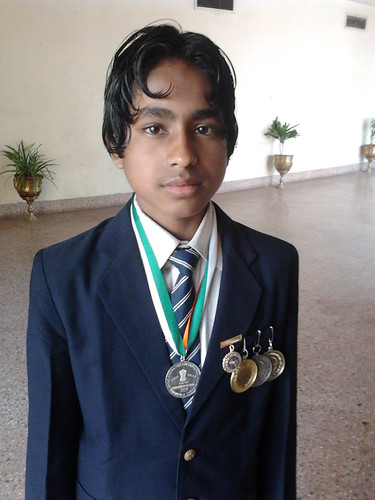By TwoCircles.net Special Correspondent,
Lucknow: It is not the name only, which 14 year old Abdul Kalam, hailing from Siwan in Bihar, shares with the former president. He sports a similar hairstyle and a similar scientific temperament. His genius has already been awarded by the President Pratibha Patil in the form of national child award for exceptional achievement in 2010. The medal is one of the 30 recognition awards from various national organizations, nicely tucked on his blazer.
Student of ninth standard, Kalam was in Lucknow last Thursday, where he was awarded by the All India Pasmanda Muslim Mahaz (AIPMM). Belonging to a modest and humble family, Kalam shared his upcoming project with TCN. The project if successful will be a bane for water scarce regions, providing ample water to irrigate the fields.

Abdul Kalam with the President’s Medal
Acknowledging Kalam’s efforts, the Ministry of HRD has decided to dispatch a team of experts for studying the feasibility of the project.
“For the past several months I have been working on this project of purifying sewage water through cost effective and eco-friendly ways. The processed water is pure enough to be flushed in fields for irrigation purpose. It will save the water from going waste, besides scaling down pollution level in water bodies, as the untreated water is a major source of pollution,” said Kalam sharing his project.
Kalam’s Project
It took Kalam nearly three months to frame the basic model. He even commissioned it on a trial basis at a village and got encouraging results. The model includes four pits, dug at some distance with the first one receiving sewage water. An iron net in the first input pit holds back the litter and other impurities including polythene and plastic wastes. The plastic matter is taken out and transferred in a separate enclosure where they are treated with micro-organism for bio-degradation.
In a span of two months, the waste is converted into manure. Meanwhile as water reaches second pit, a jute net acts as sieve absorbing the chemicals and oil impurities, which can be later treated with bacteria named ‘ET Zyper’ ensuring the consumption of the impurities. The leftover treatment of water is done by aquatic plants in the third pit, thus reasonably pure water reaches fourth pit. “We put fishes in the fourth pit and if they survive, it substantiates that the water is fit for irrigation,” claimed Kalam.
The project may lack the fineness, but considering Kalam’s age, it surely is an achievement by any standard. A team from HRD ministry will be on its trip to Siwan, Bihar, today to undertake a litmus test of Kalam’s innovations. It is still early to comment that his project will be able to see the light of the day; however this little genius remains a gem, needing proper motivation and succor to shine. We wish him All the Best!!!
